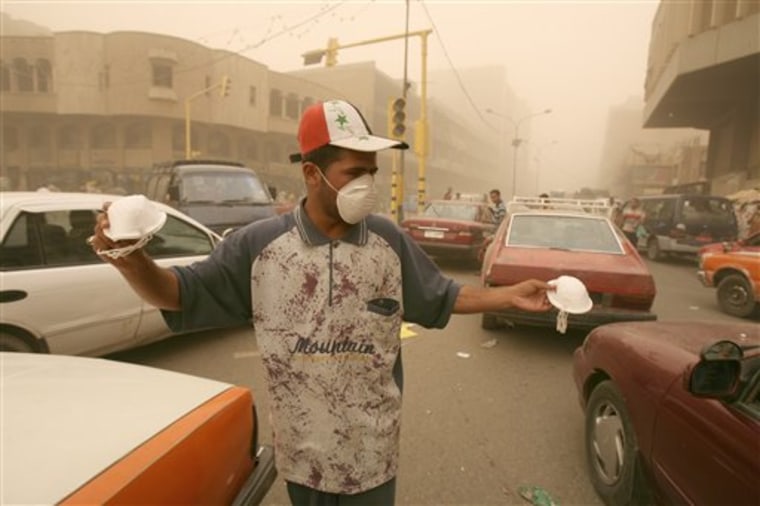Al-Qaida fighters and other Sunni insurgents have largely scattered from the northern city of Mosul in the face of a U.S.-Iraqi sweep, fleeing to desert areas further south, an Iraqi commander said Sunday. He vowed the forces will not allow them to regroup.
The U.S. military said al-Qaida in Iraq was "off-balance and on the run" but remains a very lethal threat, tempering remarks by the U.S. ambassador a day earlier that the terror network was closer than ever to being defeated.
The comments came amid a flurry of attacks in Baghdad and other areas, most likely attributable to Sunni insurgents. A roadside bomb targeted a patrol of U.S.-allied Sunni Arab fighters near a mosque in northern Baghdad, killing one of the so-called Awakening Council members and wounding three others, a police official said.
Bombings and shootings killed three people in and around the city of Baqouba, north of Baghdad, where U.S. forces waged a fierce offensive last year to break al-Qaida domination of the city, police said. Police officials in both cities spoke on condition of anonymity because they were not authorized to talk to the press.
Iraqi security forces also made their first major discovery of a weapons cache in Baghdad's Shiite district of Sadr City, where troops and police deployed last week — a move that could raise tensions in the military's truce with the powerful Mahdi Army militia.
An al-Qaida stronghold
The U.S. and Iraqi military have called Mosul the last remaining urban stronghold for al-Qaida in Iraq after successes against the terror network in Baqouba and major towns in the western province of Anbar.
Iraqi Defense Ministry spokesman Maj. Gen. Mohammed al-Askari said security forces had arrested some 1,030 people during their sweep the past week in Mosul. Another 251 detainees had been freed after being cleared of suspicion, he said.
He said some 2,000 al-Qaida and other Sunni insurgent fighters were believed to have been in the city before the sweep was launched. He could not say how many remained in the city, but said most who managed to flee were believed to be taking refuge in deserts near the cities of Tikrit and Ramadi, further south.
"Now they are in a confused situation," he said at a joint news conference with U.S. military spokesman Rear Adm. Patrick Driscoll. "We will not allow them to reorganize themselves."
After past sweeps, Sunni insurgents have regrouped to carry out major attacks and dominate other cities to use as a planning base.
U.S. and Iraqi officials have been taking a more confident tone over security gains in Iraq in recent weeks, particularly since the high profile crackdowns in Mosul and Sadr City, and the southern city of Basra. Those sweeps aim to impose Iraqi government control in areas that have been under the control of Shiite militias or Sunni insurgents.
U.S. Ambassador Ryan Crocker said Saturday that Iraqi forces have made important progress in confronting extremists, adding, "You are not going to hear me say that al-Qaida is defeated, but they've never been closer to defeat than they are now."
Driscoll sounded a cautionary note, however. He said that while al-Qaida in Iraq fighters "certainly are off-balance and on the run," the group "remains a very lethal threat."
Still, the number of attacks in the past week decreased to a level "not seen since March 2004," he said, without giving specific figures.
Cautious about security gains
The U.S. military has consistently been cautious about recent security gains amid fears that al-Qaida and other insurgents are trying to regroup after suffering setbacks from military operations as well as a Sunni revolt against the terror network.
Sunni tribal leaders who have joined forces with the Americans have been credited as a key reason for the sharp decline in violence over the past year. The other factors include a troop buildup of some 30,000 additional American forces, which is currently being reduced, and a fragile cease-fire with anti-U.S. Shiite cleric Muqtada al-Sadr, the leader of the Mahdi Army.
Iraqi forces in Sadr City — the Mahdi Army's longtime stronghold — have found a number of large weapons caches in the district, including ones in a mosque and a hospital, a military official said, speaking on condition of anonymity because he was not authorized to release the information.
Among the weapons were rockets, anti-tank shells and land mines, he said.
The issue of weapons searches is a sensitive one. Under the truce, Mahdi Army fighters in Sadr City are keeping their light weapons, and the group has denied having heavier weapons like explosives in the area. Al-Sadr officials have warned the government not to be too aggressive in its searches and arrests of wanted militiamen, and the two sides have held talks on how to carry out raids without sparking tensions.
The Sadrist Movement says it is sticking by the truce. But weapons seizures could provoke rogue Mahdi Army members already impatient with the cease-fire, which has been crucial to keeping the Sadr City deployment smooth since it began Tuesday.
At the same time, the past several days have seen violence in other Shiite districts of Baghdad as Iraqi forces move against militias there, including the Mahdi Army.
Clashes broke out before midnight Saturday between Shiite gunmen and U.S.-Iraqi troops in the Amin area in eastern Baghdad, killing two civilians and wounding three others, including a 4-year-old boy, according to police and hospital officials.
